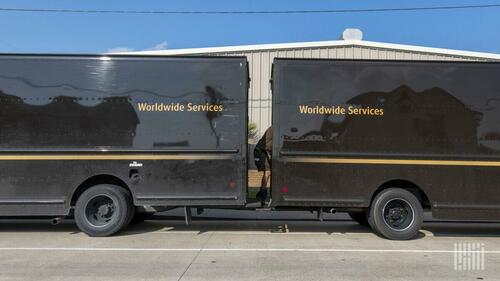UPS Offers Rebates To Win Back Diverted Volumes
By Mark Solomon of FreightWaves
In an effort to recapture volumes diverted to rivals ahead of a five-year contract with the Teamsters union, UPS will offer rebates to offset early-termination penalties should customers break their new contracts to return their traffic to the carrier.
UPS CEO Carol B. Tomé affirmed the policy at an analyst breakfast this week, according to those in attendance. According to Ken Hoexter, analyst at Bank of America, Tomé said the costs of the rebates would be minor and would not impact the company’s or the industry’s yield focus. There were no specifics about how widespread the rebate program would be.
UPS lost about 1.2 million daily parcels as shippers concerned about service disruptions shifted traffic to other carriers. Rival FedEx Corp. received about 400,000 of the diverted parcels. The rest was split between the U.S. Postal Service and an array of regional delivery carriers.
UPS has said it hopes to win back most, if not all, of the diverted volumes by the end of 2023 and expects year-on-year domestic parcel volume growth to return to flat by year’s end, compared to what was a 10% year-on-year drop in the second quarter. September volumes are returning at a faster clip than in August, UPS told analysts.
Much of the analyst meeting focused on UPS’ attempts to leverage automation to drive down labor costs in its facilities. To offset its union contract cost — nearly half of the overall increase will occur in the first year — UPS plans to lower the 140,000 part-time employee head count inside its sort centers over the next few years, analysts were told. Collectively, these part-time unionized workers represent about $3 billion a year in potential cost savings, according to analysts attending the meeting.
Language in the contract requires UPS to negotiate with the Teamsters at least 45 days before it introduces certain technology such as drones, driverless vehicles and platooning into its network. Much of the public discussion, however, centered on technology like autonomous vehicles and drones that support transportation functions. It did not address the use of robotics, for example, inside the company’s sortation centers.
It is believed that UPS gained broader freedoms to use inside-the-facility technology in return for the significant wage increases in the contract’s first year. Increases will be muted in years two through four and re-accelerate in year five, though not as significantly as in year one.
The company will expand on its labor-savings and productivity efforts in March when it hosts an investor’s day in Atlanta, where it is based.
At the meeting, UPS executives acknowledged that volumes continued to be pressured by macro weakness in the U.S. and abroad. Inflation, a slowing economy and a shift in consumer expenditures from goods to services are all impacting volume growth, executives said.
Tyler Durden
Mon, 10/02/2023 – 10:55
via ZeroHedge News https://ift.tt/A0V4UnQ Tyler Durden
